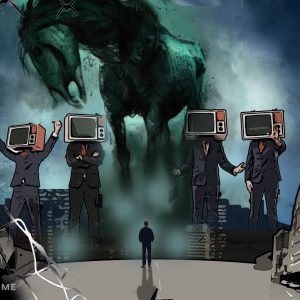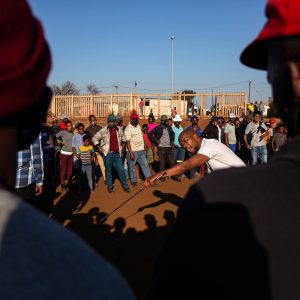Xenophobic South African mobs: ‘We are sanitising’
Residents of areas in Thokoza cite frustration about their own mass unemployment to justify evicting migrant neighbours and burning their property in the streets.
Author:
31 July 2020
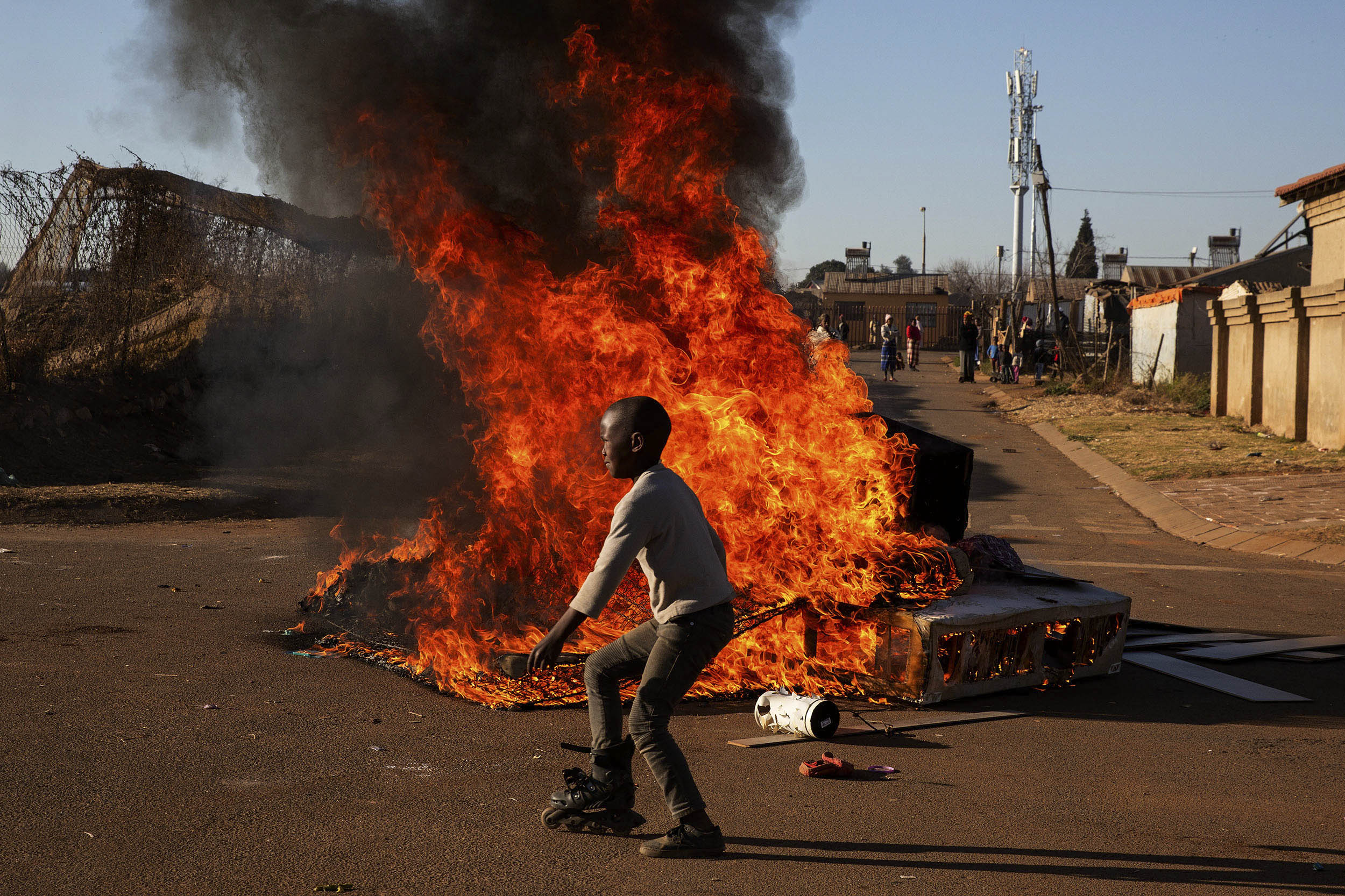
Simangele Dube tried pleading with the mob that arrived on her doorstep on the morning of Thursday 30 July to demand that she leave her house. By then, groups of South African residents of Phola Park in Thokoza, south of Johannesburg, had been going from door to door since at least Tuesday night telling migrants to leave the area.
On Wednesday, it escalated with migrant-owned businesses and shops looted and destroyed. It carried on during the night, with many migrants fleeing with what little possessions they could carry with them.
While her husband was at work in Pretoria on Thursday morning, the mob arrived outside Dube’s house, intimidating her and her eight-year-old daughter. They forced her out of the house and the mob ransacked it, destroying documents and stealing her cellphone before setting her husband’s car alight in the street outside their house in Extension 1.
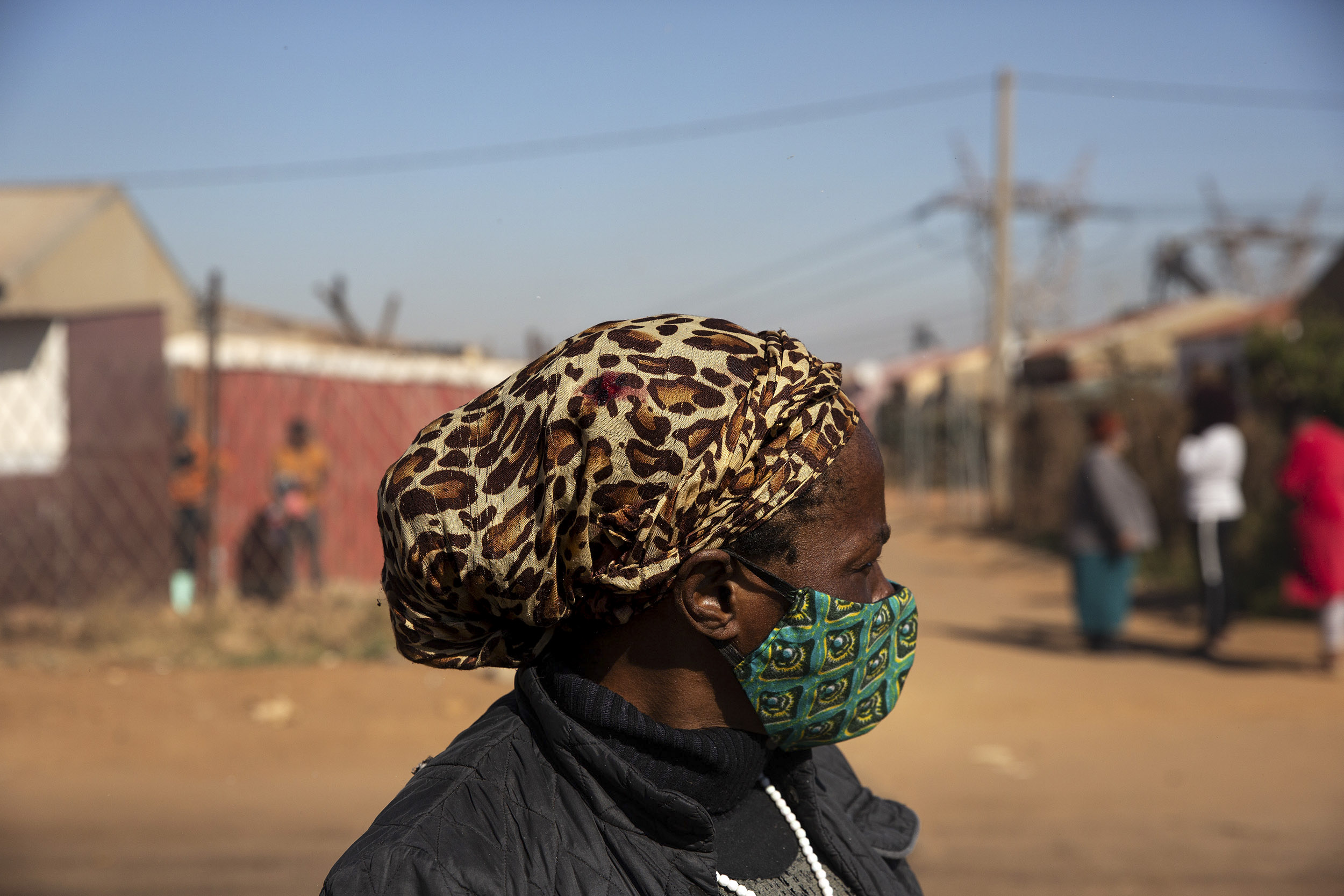
“I’m feeling so bad. I don’t have any place to sleep tonight. They took everything and even burnt her birth certificate,” Dube, 54, said, referring to her daughter, Cynthia.
There was a bloodstain on her doek (headscarf) where someone had landed a blow during the incident. Dube was clearly still in shock after the attack and seeing the state of her home. School textbooks, religious texts, clothes and other household goods littered the yard as the car continued burning in the street next to her.
“They came here and said the issue is with foreigners, but they know very well we aren’t foreigners. I’m married to a South African man,” she said. “They chased me away. I tried to explain, ‘No guys, you have it wrong’, but they did not care and chased me away.”
Related article:
Dube, originally from Zimbabwe, married a Muslim South African 15 years ago and has had South African citizenship for 10 years. Despite telling this to the mob, it carried on and chased her out.
“I know that people think if he is a Muslim, he is a foreigner. But he is not a foreigner. I’m very angry because how can they do this?” she asked. Dube and her daughter were eventually taken to a place of safety by Amir Sheikh, spokesperson of the African Diaspora Forum.
Phola Park has been without electricity for as many as six weeks, according to some residents. When the City of Ekurhuleni announced earlier this week in a Facebook post that it could take a further three weeks to restore the electricity, residents started protesting.
-
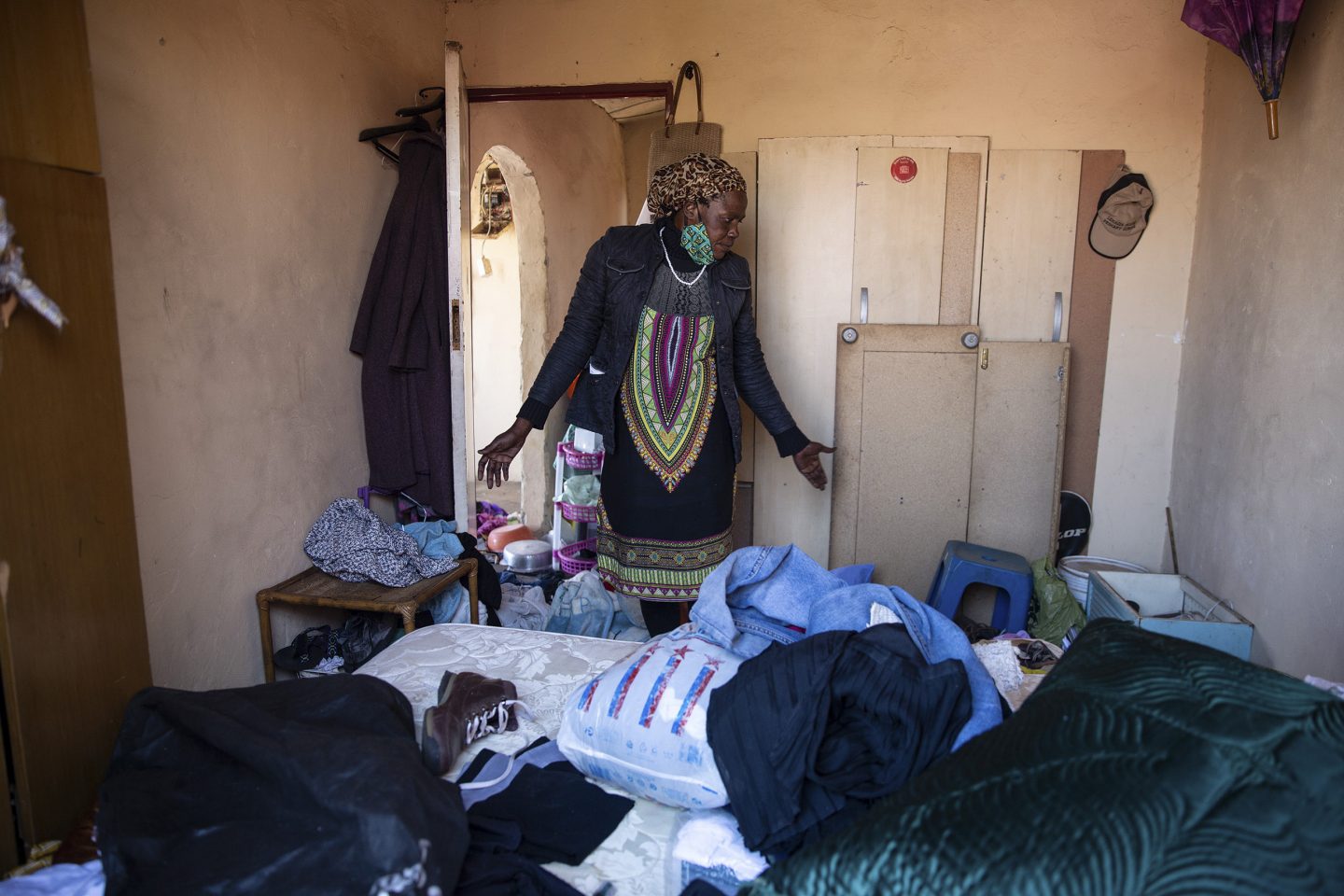
30 July 2020. Simangele Dube tries to salvage some possessions in her ransacked house. She was born in Zimbabwe but married to a South African, muslim man. Their house was looted and her possessions (including the family car) burned. She also sustained a head wound when beaten by her neighbours. Residents of Phola Park, chased out their migrant neighbours and burned their belongings in the street. They said they were doing “Spring Cleaning” and “Sanitizing” their township. Residents also say that the area has been without electricity for more than 3 weeks. Picture: James Oatway. -
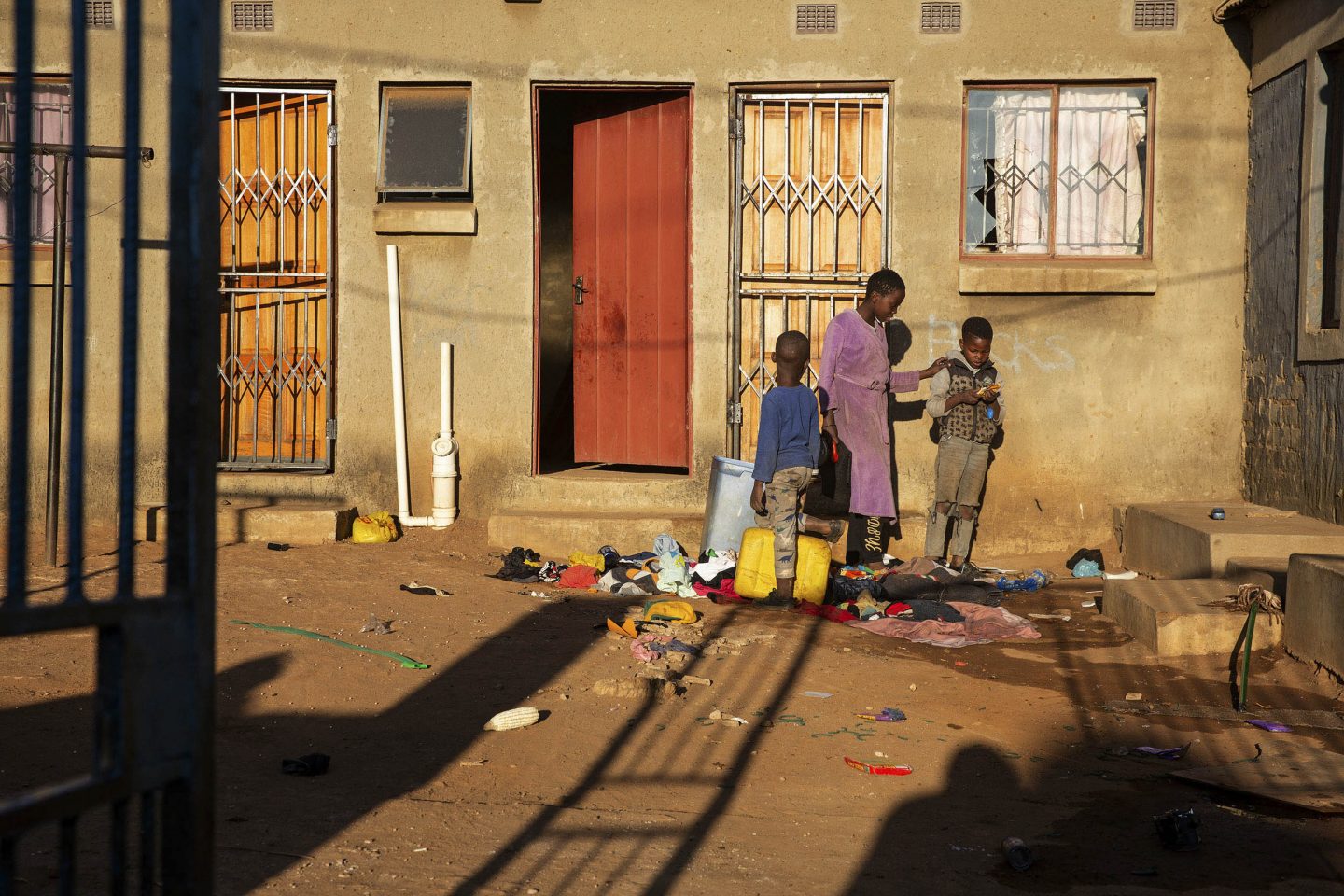
30 July 2020. Children from nearby houses search through the belongings of migrants that were forced to flee from their homes during the night. Residents of Phola Park, chased out their migrant neighbours and burned their belongings in the street. They said they were doing “Spring Cleaning” and “Sanitizing” their township. They also looted migrant-owned shops. Residents say that the area has been without electricity for more than 3 weeks. Picture: James Oatway.
Police excuses
Brigadier Mathapelo Peters, spokesperson for the South Africa Police Service (SAPS) in Gauteng, said 20 people had been arrested in connection with service delivery protests in the area. Peters described it as “lawlessness” and said the police were investigating “crime” when asked about the attacks on migrants.
“Police have intensified deployment and are on high alert since Wednesday evening 29 July 2020 monitoring closely the areas around Eden Park, Thokoza, Phola Park and Reiger Park,” she said. “This comes after incidents of violence and general lawlessness erupted from what started as sporadic service delivery protests related to electricity cuts in the mentioned areas on Wednesday afternoon. Criminal elements took advantage of the protests and attacked and looted three shops in Eden Park. A warehouse was also torched.”
Sheikh rejected claims that it was a service delivery protest and said residents had been planning this for a while. “It’s been building up for years even,” he said. “It’s not a service delivery [issue]. This is actually pure xenophobia and a way to get an audience with the government with their unjustifiable demands. It’s not even concerns, because they are saying migrants are taking our businesses. It’s all unjustifiable.”

He added: “You can look at it like this: we are the weakest link and by attacking the migrants you will actually get the ear of the government. This is nothing about service delivery.”
Sheikh estimated that 124 spaza shops, stalls and other businesses in the area were either damaged or looted.
Earlier in July, participants in a truck drivers’ strike led by the All Truck Drivers Foundation ended up at a football field in Thokoza, where they were joined by many local residents who raised concerns about their unemployment and the employment of migrants in a number of industries.
Related article:
Luan Bentley, who was at that meeting and describes himself as a community activist, said at the time: “We’ve approached several industries, we’ve approached several sectors. All the investors have a tendency to employ foreign nationals and we feel as South Africans that they are undermining our integrity and our dignity. Because the dignity of a man is not land – it is employment that can change my life.”
On Wednesday, as the violence escalated in the area, Bentley said it was “inevitable” because the government had been ignoring their demands.

-
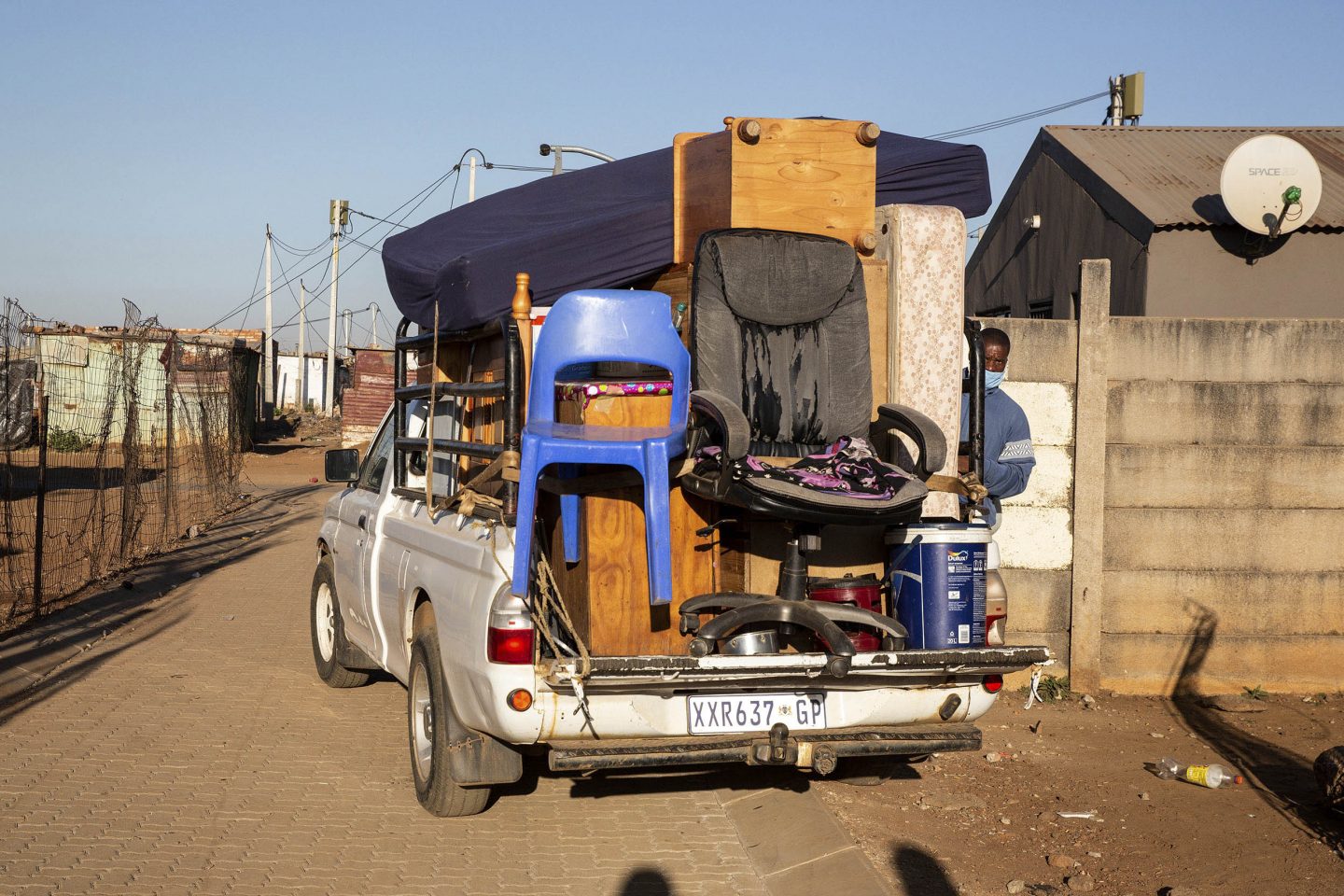
30 July 2020. A man helped a Zimbabwean woman evacuate before her possessions could be burned. Residents of Phola Park, chased out their migrant neighbours and burned their belongings in the street. They said they were doing “Spring Cleaning” and “Sanitizing” their township. Residents also say that the area has been without electricity for more than 3 weeks. Picture: James Oatway. -
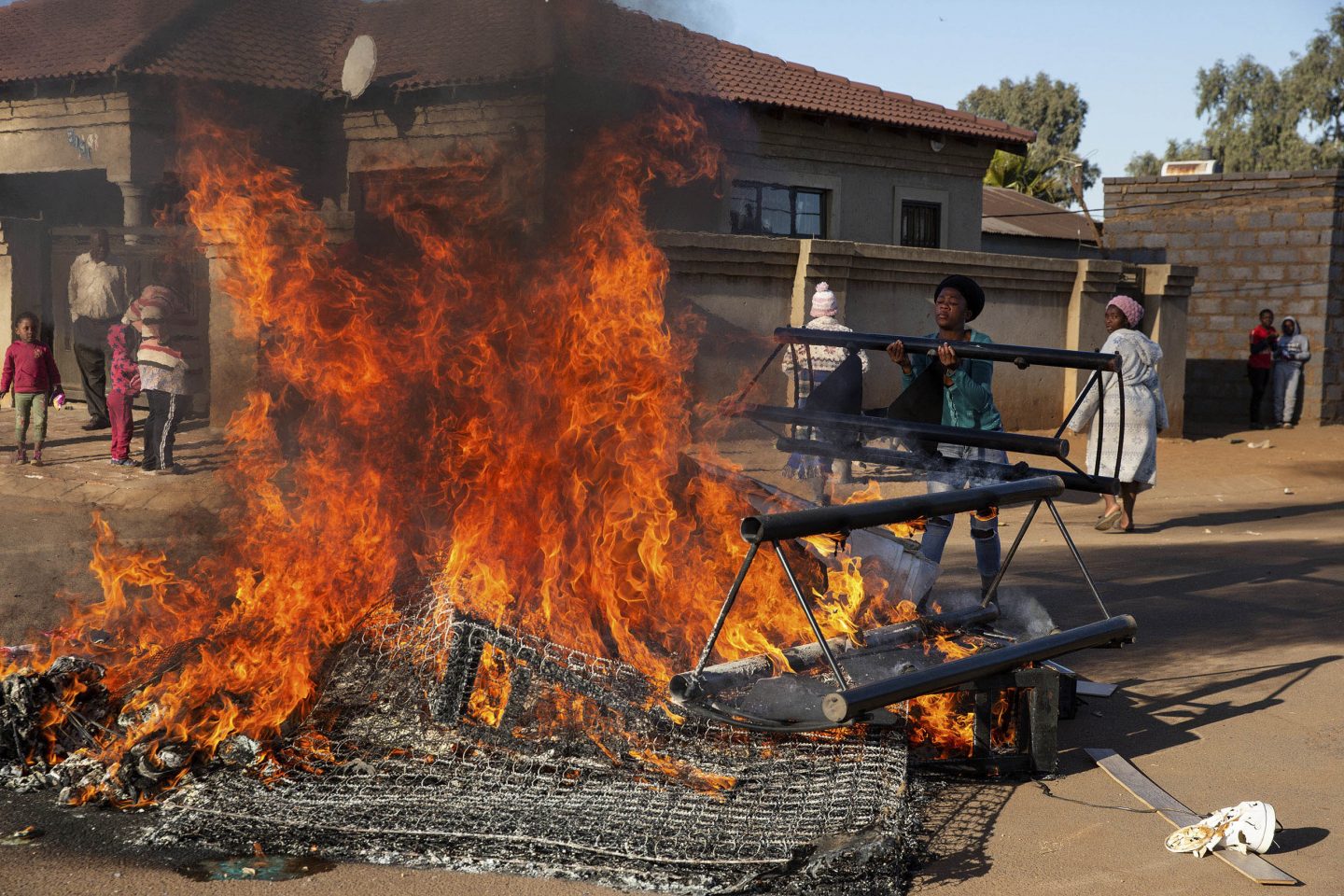
30 July 2020. Residents of Phola Park, chased out their migrant neighbours and burned their belongings in the street. They said they were doing “Spring Cleaning” and “Sanitizing” their township. Residents also say that the area has been without electricity for more than 3 weeks. Picture: James Oatway.

‘We’re just sanitising the area’
Earlier on Thursday morning, a group of people standing outside the vacated property where Zimbabwean migrants had been living until they fled the night before made similar statements. They blamed migrants for the high rate of unemployment in the area. The possessions left behind by the Zimbabweans were carried out into the street and set alight.
This happened at various intersections in Phola Park, with children helping adults carry furniture, appliances, clothes and other possessions left behind by those who had fled.
Thembisile Stofile, who has been living in Phola Park for the past nine years and is unemployed, said local residents are surviving on odd and piece jobs while companies prefer to employ migrants.
“Every company employs, like, 70% foreigners. Last Saturday there was a meeting and they decided we must get rid of the foreigners,” he said, watching the burning debris in the street. “They employ foreigners because it is cheap labour.”

Sibusiso Mokoena, standing next to Stofile, said: “We’re tired of foreigners. This time they won’t come back. Most of the unemployed people here feel like that.”
When asked about the violence and forcing people to flee, other people in the group chimed in with “we’re just spring-cleaning” and “we’re sanitising the area”.
Standing on a street corner and watching as men and children were dumping a Zimbabwean family’s possessions on a fire in the middle of the street, Nwabisa Sharon Mgojo said she didn’t condone any violence but she wanted migrants out of the area. “I was retrenched in March. I worked as a sales representative and now I am sitting at home. But these people still have jobs to go to,” she said.
“What we want is fairness. The youth are frustrated, the community is gatvol [fed up]. We want them to go back to their countries because then we can get jobs.” The women standing around Mgojo agreed in unison. She continued: “We don’t say they must beat them. We don’t agree with that. We don’t want no harm, but they just need to go back to their countries.”

‘Xenophobia and tribalism’
A few blocks away, a Zimbabwean family was rushing to get their belongings packed on a bakkie with a trailer to leave the area as soon as possible.
Their neighbour, Maria Ndobe*, 26, a Tsonga-speaking South African from Limpopo, said she was also planning to leave the area on Thursday. “We speak Tsonga but we are classified as certain people here. We are also moving out because it is not safe. It is better than living in fear,” she said, her three-year-old daughter Cynthia* clutching at her clothes.
“I remember when we were living here in 2008 with the xenophobia, we also had to run away because of the language we speak. Now they are going from house to house looking for foreigners. That is why we are moving,” she said.
“I have to leave here for my daughter. She sees all the people – it’s a mob and she’s scared. I have to leave here for our own safety. This is not only xenophobia but it is also tribalism.”
-
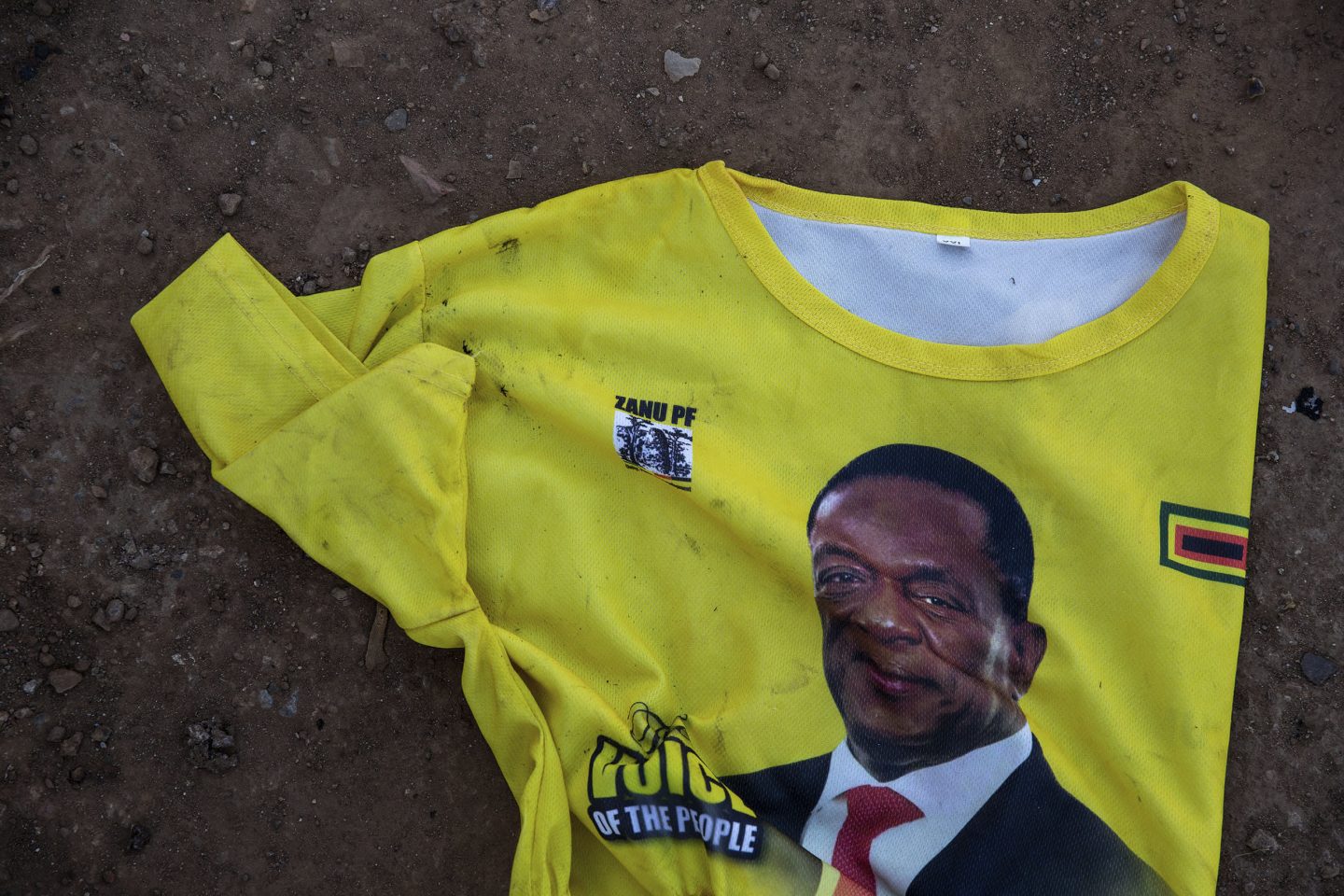
30 July 2020. A ZANU-PF T-shirt was seen among the looted goods. Residents of Phola Park, chased out their migrant neighbours and burned their belongings in the street. They said they were doing “Spring Cleaning” and “Sanitizing” their township. Residents also say that the area has been without electricity for more than 3 weeks. Picture: James Oatway. -
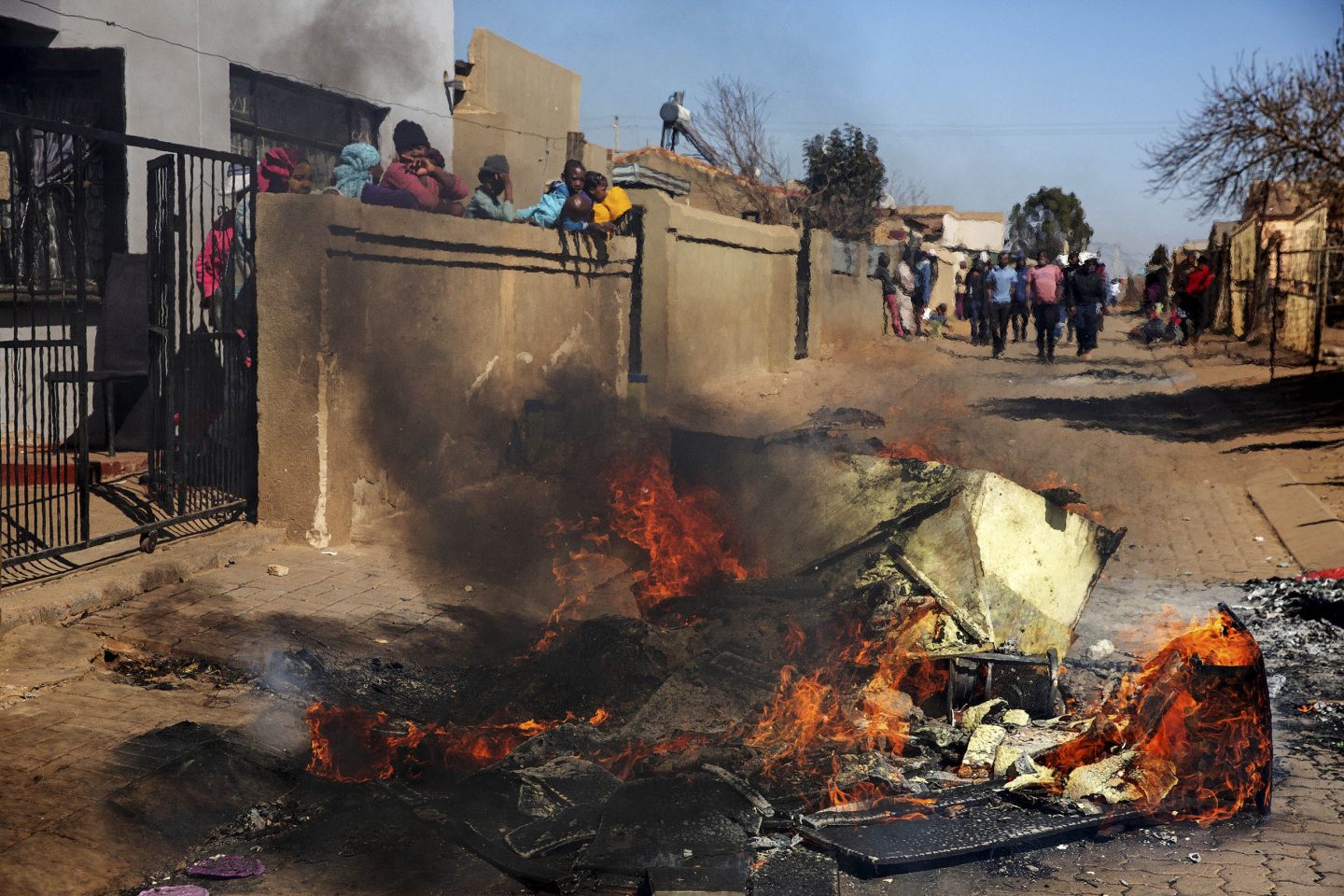
30 July 2020. Residents of Phola Park, chased out their migrant neighbours and burned their belongings in the street. They said they were doing “Spring Cleaning” and “Sanitizing” their township. Residents also say that the area has been without electricity for more than 3 weeks. Picture: James Oatway.
In a statement issued by the Consortium for Refugees and Migrants in South Africa (CoRMSA), spokesperson Abigail Dawson described the manifestation of xenophobia as “another epidemic in South Africa”.
“How can selling groceries from a spaza shop or the street be seen to be taking millions of jobs?” she asked. “Increasing unemployment worsened by Covid-19 cannot be pinned on the non-nationals, who largely work in the very precarious, unprotected, informal sector.
“Accountability needs to land on the table of our leaders, who have done little in creating sustainable social and economic reform to ensure the historical hardships of South Africans are transformed. Xenophobic violence is not arbitrary – it is organised and targeted. Police intelligence must do the work to prevent and mitigate any further damage to property and loss of life,” Dawson said.
“With scenes like this, which are repeatedly reported in our democratic country, there continues to be relentless denialism of the existence of xenophobia in South Africa. Even though this violence is explicitly directed towards foreign nationals.”
*Names have been changed to protect their identity.


